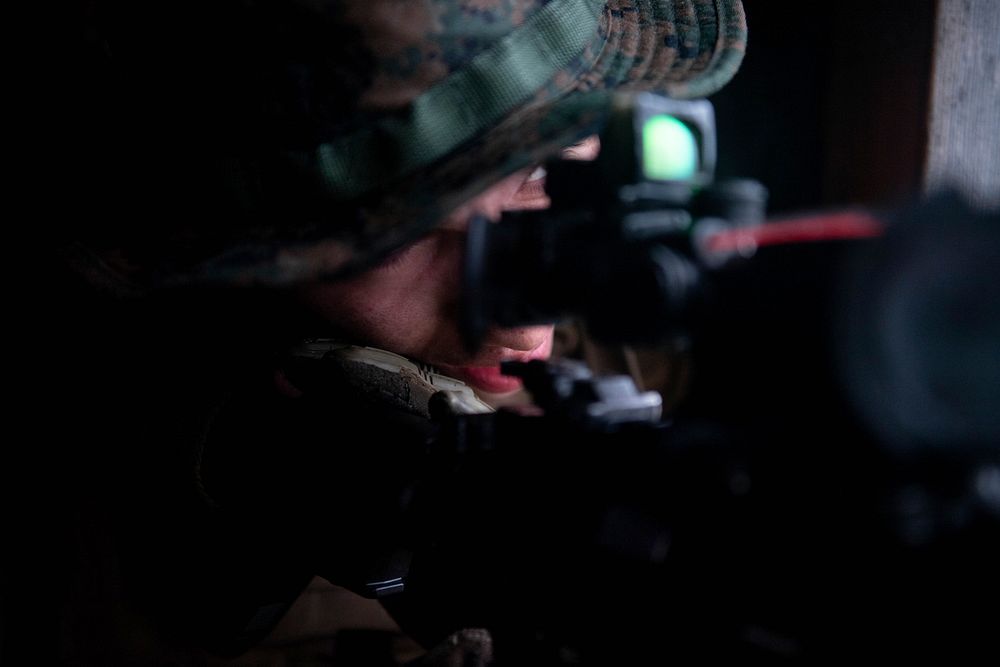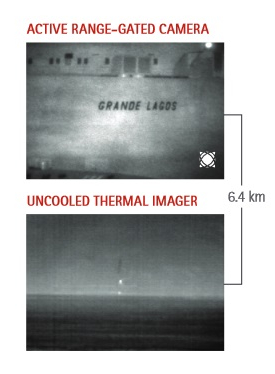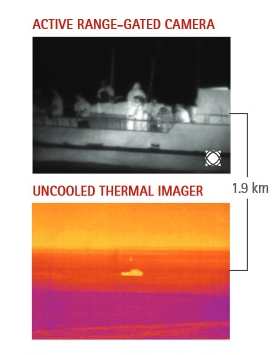OVERVIEW SPECIFICATIONS APPLICATIONS CHARACTERISTICS
Engineered for long-range identification, this system can:
Engineered for long-range identification, this system can:
It has been engineered to meet the stringent requirements of coastal & border surveillance as well as Critical Infrastructures protection. With a range gated intensified camera for night surveillance and two color sensors (Narrow Field Of View (NFOV) and Wide Field Of View (WFOV)) for day operation, the ARGC-2400 is uniquely positioned to provide unequaled identification performance.
It has been engineered to meet the stringent requirements of coastal & border surveillance as well as Critical Infrastructures protection. With a range gated intensified camera for night surveillance and two color sensors (Narrow Field Of View (NFOV) and Wide Field Of View (WFOV)) for day operation, the ARGC-2400 is uniquely positioned to provide unequaled identification performance.
Classify a vehicle at 10 km
Pinpoint people at a distance greater than 10 km
Read license plate at up to 1.2 km
Recognize a human being at 8 km
Components
Range gated intensified CCD camera
(Gen III or XR-5) Motorized zoom telescope
Aiming telescope
Near-infrared pulsed laser beam
GPS
Video display terminal
Touchscreen monitor
Recorded video
User-friendly, intuitive user interface
Target georeferencing systems
Components
Range gated intensified CCD camera (Gen III or XR-5) • Motorized zoom telescope • Aiming telescope • Near-infrared pulsed laser beam • GPS
Video display terminal • Touchscreen monitor • Recorded video • User-friendly, intuitive user interface • Target georeferencing systems
RANGE-GATED ICCD CAMERA (NIGHT TIME)
Sensor type Custom variant of Gen III Intensifier Tube
Optical magnification 60 to 240 X
Field of View (H xV) Min. 0.15°
x 0.11°
RANGE-GATED ICCD CAMERA (NIGHT TIME)
Sensor type
Custom variant of Gen III Intensifier Tube
Optical magnification
60 to 240 X
Field of View (H xV)
Min. 0.15°
x 0.11°
Effective picture element
PAL (CCIR): 782 x 582 px
NTSC (EIA): 659 x 494 px
Effective picture element PAL (CCIR): 782 x 582 px
NTSC (EIA): 659 x 494 px
LASER ILLUMINATOR (PATENT PENDING)
Wavelength 860 nm
Beam divergence Slaved to the zoom telescope FOV
LASER ILLUMINATOR (PATENT PENDING)
Wavelength
860 nm
Beam divergence
Slaved to the zoom telescope FOV
COLOR CAMERAS (DAYTIME)
NFOV Optical magnification
78 to 312 X
NFOV (HxV)
Min: 0.12°
x 0.09°
Max: 0.46°
x 0.34°
WFOV (HxV)
Min: 1.6°
x 1.2°
Max: 42°
x 31.5°
COLOR CAMERAS (DAYTIME)
NFOV Optical magnification 78 to 312 X
NFOV (HxV) Min: 0.12°
x 0.09° Max: 0.46°
x 0.34°
WFOV (HxV) Min: 1.6°
x 1.2° Max: 42
°
x 31.5°
OPTIONS
Pan & Tilt with joystick Azimuth range continuous 360
Electronic image stabilizer 0.5 to 25 Hz
Laser Range Finder 80 m to 20.5 km
OPTIONS
Pan & Tilt with joystick
Azimuth range continuous 360˚
Electronic image stabilizer
0.5 to 25 Hz
Laser Range Finder
80 m to 20.5 km
External thermal imaging system
Thermovision 3000 (FLIR)
FOX/P 720-ZE (CONTROP)
Thermal imager (external) Thermovision 3000 (FLIR)
FOX/P 720-ZE (CONTROP)
Applications
Applications
COASTAL SURVEILLANCE
BORDER SECURITY
CRITICAL INFRASTRUCTURE PROTECTION
ANTITERRORISM OPERATIONS




Best long-range imaging performance
Real-time operation in total darkness
This exclusive technology lets you operate in total darkness. Conventional night vision systems require moonlight or other ambient light. The ARGC-2400 acquires real-time videos (standard video speed of 30 frames per second), which ensures that every critical detail is recorded.


See through glass and detect camouflage nets
The wavelength range of the patent pending laser illuminator is currently between 800 nm and 900 nm. Within this range, operators are able to see through glass: car windshields, helicopters, planes, and windows.
Resist parasitic light; perform in bad weather
Range gating technology enables the ARGC-2400 to capture and display clear visual data without interference from parasitic light and adverse weather conditions (snow, fog, rain) frequently encountered in coast guard surveillance, antiterrorism operations, and search and rescue missions.
Robust cost effective design
The system is rugged and waterproof. Use it as a stand-alone camera to monitor remote battlefield areas. Or install it on any stabilized platform such as a pan-and-tilt helicopter platform or tank platform. The system can also be slaved to radar or other detection systems.
Affordable high magnification telescope
Because the system operates in the 800 to 900 nm range, the optical components required for optimal performance are not expensive. However, high-magnification IR thermal imagers require sophisticated telescopes built with specialized, high-cost materials. So their built-in costs are much higher.
Best long-range imaging performance
Real-time operation in total darkness
This exclusive technology lets you operate in total darkness. Conventional night vision systems require moonlight or other ambient light. The ARGC-2400 acquires real-time videos (standard video speed of 30 frames per second), which ensures that every critical detail is recorded.


See through glass and detect camouflage nets
The wavelength range of the patent pending laser illuminator is currently between 800 nm and 900 nm. Within this range, operators are able to see through glass: car windshields, helicopters, planes, and windows.
Resist parasitic light; perform in bad weather
Range gating technology enables the ARGC-2400 to capture and display clear visual data without interference from parasitic light and adverse weather conditions (snow, fog, rain) frequently encountered in coast guard surveillance, antiterrorism operations, and search and rescue missions.
Robust cost effective design
The system is rugged and waterproof. Use it as a stand-alone camera to monitor remote battlefield areas. Or install it on any stabilized platform such as a pan-and-tilt helicopter platform or tank platform. The system can also be slaved to radar or other detection systems.
Affordable high magnification telescope
Because the system operates in the 800 to 900 nm range, the optical components required for optimal performance are not expensive. However, high-magnification IR thermal imagers require sophisticated telescopes built with specialized, high-cost materials. So their built-in costs are much higher.








